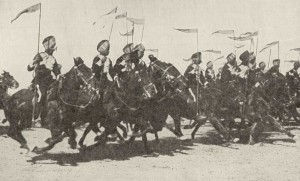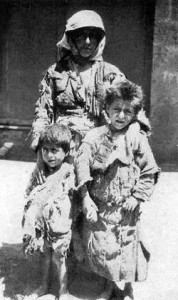Shared Sorrows: Indians and Armenians in the prison camps of Ras al-‘Ain, 1916-18 – 14
Sisir Sarbadhikari was not the only Indian in the Ras al-‘Ain camp for long: it soon began to fill up with British, Russian and Indian POWs including many other members of the Bengal Ambulance Corps, his friend Bhola among them (p.172).

As the months went by the prisoners learnt that there had been a revolution in Russia; that Istanbul had been rocked by unrest; and that British and Indian troops were making rapid advances in Palestine and Mesopotamia.
By the middle of 1917 it was apparent that tide of war was turning in the Middle East and the Germans and Ottomans were in retreat.[i]
For the Armenian refugees, this created a new set of anxieties for they were now seized by the fear that the Turks, faced with the prospect of losing the war, ‘would slaughter those of them who were still alive – and this time even the women would not be spared.’ [ii]
But it still came as a surprise to Sisir and his friends when they discovered that the Armenians were planning an escape: it was Ilyas who revealed this to them.
‘Ilyas looked on Bhola and me like older brothers,’ writes Sisir, ‘and we too loved him like a younger brother. In 1918, towards the end of August or the beginning of September, when the Turks were in a much-weakened state, Ilyas came to us one night.
At the time Phoni, Bhola and I were living in one room… Ilyas and Yakob were living a little distance away. What he whispered, after waking us, was this:
‘… For a few days [the Armenian mohajers] had been conferring in secret on matters such as how best they might escape to places that were now under Russian or British control. It seemed that they had not included Yakob in all this, perhaps because those who were planning to escape (p.177) were all residents of Erzurum and its surrounding areas. Yakob’s home was much further south.

‘Now their destination had been decided on – where it was Ilyas did not yet know. They would flee that night, horses had been arranged. He had come to take his leave of us. Whatever warm clothing we had between us we gathered together and gave to Ilyas – the poor fellow had hardly any clothes.
‘He held me tight! None of us could say a word; nor was there any need for anything to be said.
‘In the dead of night Ilyas left. We never saw him again
‘Did he manage to reach home? Did he find his mother and his sister?’
Here Sisir quotes a line from a poem by Tagore:’Those who lose everything gain the whole world.’ (p.178)[iii]
[i] Chronologically speaking Sisir was once again able to rely on his journal from this point on for his notes resume from April 1918 (the gap dates back to April the year before).
[ii] The word that Sisir uses to describe these killings is worthy of note. Earlier, when writing about the killings of Armenians he generally uses the word kâtâ : literally ‘to cut’ or slaughter. But here he uses the word hatyakanda, literally ‘killing-deed’, signifying mass killings.The word ‘genocide’ had not of course yet been invented, nor its Bengali counterpart.
[iii] The poem is ‘Hatobhagyer gaan’, written in 1899 (1305 by the Bengali reckoning); it is included in Tagore’s Gitobitan. I am grateful to my sister Dr Chaitali Basu and Dr. Swachhatoya Bannerjee for tracing the poem.
